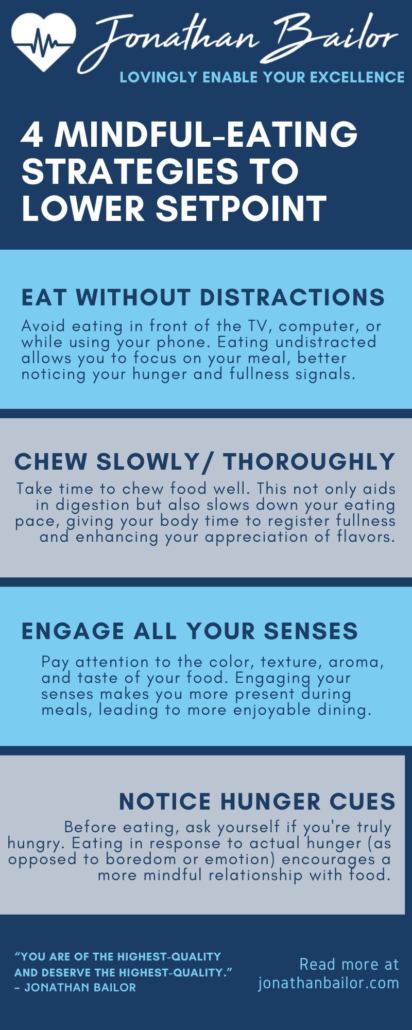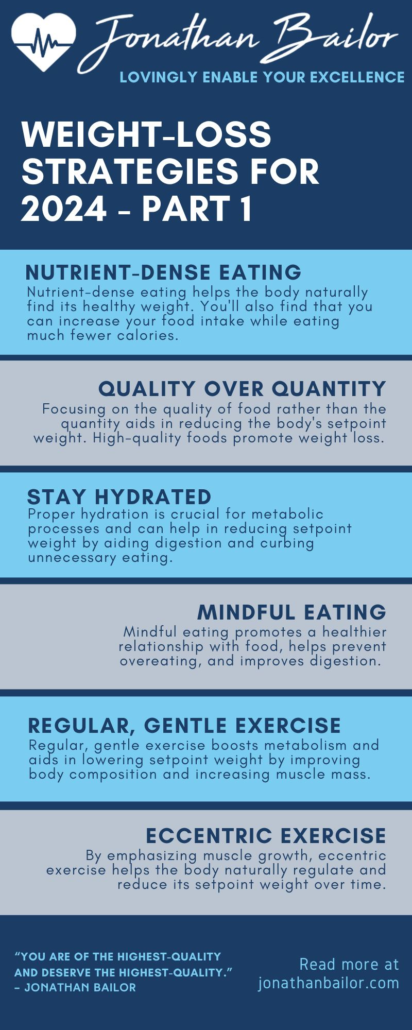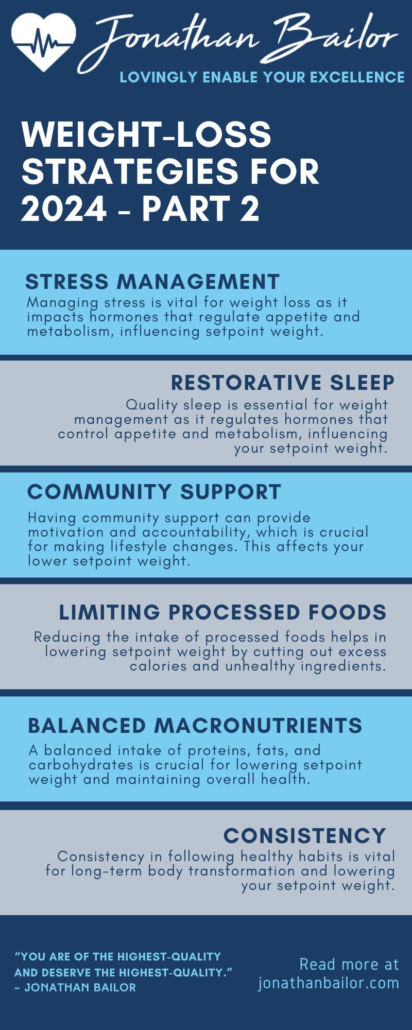New Year, New You: 12 Revolutionary Weight Loss Strategies for 2024
Step into a world of transformation with these 12 weight loss strategies for 2024. They are meticulously crafted, scientifically-backed strategies, each designed to revolutionize your weight loss approach. Moving beyond mere calorie counting, this journey emphasizes nourishing your body with whole, nutrient-dense foods, the key to gently adjusting your body’s setpoint weight towards a natural balance and wellness. Jump in with Jonathan Bailor for this exclusive hormone health guide to a new you!
By integrating a variety of physical activities, including targeted eccentric resistance exercises, these strategies enhance your body’s inherent ability to effectively manage weight, aligning closely with your natural setpoint.
Moreover, these strategies deeply recognize the importance of mindful eating, effective stress management, and restorative sleep in maintaining a healthy body weight setpoint. Each element interplays to form a comprehensive and sustainable pathway, not just to a more balanced weight but towards long-term health and vitality, harmonizing with your body’s unique setpoint weight
If you love content like this then make sure to check out our 26 Lifestyle Tweaks for a Vibrant Endocrine System: Timetable for Change and From Slow to Glow: 7 Transformative Metabolism and Weight Loss Methods guides!
Understanding Body Weight Set Point: The Key to Sustainable Weight Loss
In the realm of sustainable weight loss, understanding the concept of the body weight set point is like uncovering a hidden treasure in health and wellness. It’s a term that might sound technical, but its implications are profoundly personal and deeply rooted in our journey toward achieving and maintaining a healthy weight.
The body weight set point is essentially the weight range your body strives to maintain, regulated by a complex symphony of hormones, genetics, and brain signals. It’s like an internal thermostat for your weight, calibrated by your body’s biological mechanisms. This set point ensures that your body has enough energy reserves to function optimally, safeguarding against both excess weight loss and gain.
Now, why is the set point so crucial to sustainable weight loss? The answer lies in the way our bodies respond to weight loss, especially rapid weight loss or extreme calorie restriction. When you lose weight quickly, your body perceives this as a threat – a sort of emergency – and works hard to bring you back to what it considers your “normal” weight. This is why rapid weight loss is often followed by rapid weight regain, a frustrating and demoralizing cycle for many.
This is where the beauty of understanding and working with your body’s set point comes into play. Losing excess body fat sustainably is achieved not by fighting against your body’s natural tendencies but by gently nudging your set point to a healthier level. This is done through a combination of lifestyle changes that go beyond mere calorie counting.
So, how do we influence this set point? The approach is multifaceted:
- Nutrient-Dense Foods: By nourishing your body with foods rich in nutrients but low in calories, you provide all the necessary components for health without excess energy that gets stored as fat. This helps to gradually adjust your set point downward, which will help you lose weight long-term.
- Eccentric Exercises: Resistance training, particularly eccentric exercises, builds lean muscle mass. More muscle mass means a higher metabolic rate, which can slowly lower your set point.
- Reducing Stress and Improving Sleep: Chronic stress and poor sleep can wreak havoc on your hormones, particularly those related to appetite and metabolism. By managing stress and prioritizing sleep, you help stabilize these hormones, supporting a gradual reduction in set point.
- Consistency over Intensity: Instead of drastic diets or extreme exercise regimens, consistent, moderate changes in eating and exercise habits can encourage your body to adjust its set point without triggering the defense mechanisms against rapid weight loss.
- Listening to Your Body: Understanding hunger cues and learning to eat until just satisfied (not full or stuffed) helps align your eating habits with your body’s actual needs, aiding in the gradual change of the set point.
Essentially, the journey to sustainable weight loss is more about harmony than conquest. It’s about understanding your body’s inherent wisdom and working with it to achieve lasting health and wellness. By respecting and adjusting your body weight set point through holistic and sustainable lifestyle changes, weight loss becomes not just a goal but a natural, maintainable state of being.

Feeling Better Is Priceless, That's Why We Don't Put A Price On It!
“It’s Like A Free and Medically Valid Version of Noom and Weight Watchers Online”
~ Dr. Doctor Matthew Oleshiak, MD
Click the 'LEARN MORE' button below for free lifetime access to the fast fix program developed by Jonathan and top Ivy League Medical Doctors
LEARN MOREP.S. It's not a free trial. It's not part of the program for free. The entire program is free, forever, for real! No credit card needed.
Transformative Weight Loss Strategies for 2024
Welcome to a comprehensive guide to revolutionizing your approach to weight loss in 2024. Here, we unfold a series of innovative strategies, each designed to align with your body’s natural rhythms and setpoint, ensuring a journey that’s not just about shedding pounds but embracing a healthier, more vibrant version of yourself.
1. Nutrient-Dense Eating
Eating nutrient-dense foods is essential for lowering the body’s setpoint weight. These foods provide the necessary vitamins and minerals without significantly raising blood sugar and insulin levels. High insulin levels tell the body to store more fat, especially around the abdominal area. Nutrient-dense eating helps the body naturally find its healthy weight. You’ll also find that you can increase food intake while eating fewer calories with nutrient-dense eating than with heavily processed foods.
You can embrace the power of nutrient-dense eating habits with these tips:
- Focus on foods high in nutrients that do not spike your blood sugar levels—think leafy greens, lean proteins, and natural, whole-food fats. These foods tend to be lower in calories than their processed counterparts, too!
- Incorporate a variety of colorful vegetables and low-fructose fruits into your meals.
- Choose foods in their most natural form, avoiding heavily processed options.

2. Quality Over Quantity
Focusing on the quality of food rather than the quantity aids in reducing the body’s setpoint weight. Eating nutrient-rich foods until you are satisfied helps regulate appetite and metabolism. High-quality foods promote weight loss effortlessly.
Prioritize the quality of your food to naturally guide your weight loss journey with these tips:
- Eat until you feel satisfied, not necessarily full.
- Listen to your body’s hunger cues and eat accordingly.
- Avoid strict calorie counting; instead, focus on the quality of the food.
3. Stay Hydrated
Proper hydration is crucial for metabolic processes and can help reduce setpoint weight by aiding digestion and curbing unnecessary eating.
Hydration is a key ally in your weight-loss efforts. You can stay more hydrated with these tips:
- Drink plenty of water throughout the day.
- Consider herbal teas as a hydrating option.
- Limit sugary drinks and high-calorie beverages.
4. Mindful Eating
Mindful eating promotes a healthier relationship with food and can help you lower the setpoint weight and lose body fat by preventing overeating and improving digestion.
Cultivate a mindful approach to eating for a deeper connection with your food choices by following these tips:
- Eat slowly and savor each bite.
- Avoid distractions like TV or phones during meals.
- Pay attention to how food makes you feel and adjust your diet accordingly.

5. Regular, Gentle Exercise
Regular, gentle exercise boosts metabolism and aids in lowering setpoint weight by improving body composition and increasing muscle mass.
Integrate regular, gentle exercise into your daily routine for consistent weight loss results. Here are a few tips to get you started:
- Incorporate daily physical activities like walking, cycling, or swimming.
- Aim for at least 30 minutes of moderate exercise most days.
- Use stairs instead of elevators, and walk for short errands.
6. Eccentric Exercise
Eccentric exercise focuses on the lowering phase of a movement, where muscles lengthen under tension, such as when lowering weights or during the downward motion of a squat. This type of exercise is more efficient and effective than traditional exercise for building muscle strength, enhancing metabolic health, and consequently lowering the setpoint weight.
By emphasizing muscle growth and maintenance, eccentric exercise helps the body naturally regulate and reduce its setpoint weight over time, making it a key component in sustainable weight loss strategies.
Explore the benefits of eccentric exercise for enhanced muscle strength and metabolism with these tips:
- Engage in resistance training, focusing on eccentric movements, i.e., the lowering portion of the movement.
- Include bodyweight exercises like push-ups and lunges.
- Start with lighter weights and gradually increase as you build strength.
7. Stress Management
Managing stress is vital for weight loss as it impacts hormones that regulate appetite and metabolism, influencing setpoint weight.
Manage stress effectively to support your weight loss goals with these tips:
- Practice relaxation techniques such as yoga, meditation, or deep breathing.
- Allocate time for hobbies or activities you enjoy.
- Ensure a work-life balance to minimize stress.
8. Restorative Sleep
Quality sleep is essential for weight management as it regulates hormones that control appetite and metabolism, influencing setpoint weight.
Prioritize restorative sleep to support your body’s natural weight-loss processes with these tips:
- Aim for 7-8 hours of quality sleep each night.
- Establish a relaxing bedtime routine to help you wind down.
- Keep electronic devices out of the bedroom to improve sleep quality.
9. Community Support
Community support can provide motivation and accountability, which is crucial for making lifestyle changes that affect setpoint weight.
Leverage the power of community support for motivation and accountability. Here are a few tips to get you started.
- Join support groups or communities focused on healthy living.
- Share your goals with friends or family members for accountability.
- Engage in group activities or exercises for motivation.
10. Limiting Processed Foods
Reducing the intake of processed foods helps lower setpoint weight by cutting out excess calories and unhealthy ingredients.
Reduce your intake of processed foods to minimize unnecessary calories and additive with these easy tips:
- Cut back on foods high in added sugars, sugary foods, and unhealthy fats.
- Avoid sugar-sweetened beverages
- Read food labels to make informed choices.
- Prepare meals at home to control ingredients and portions.
11. Balanced Macronutrient Intake
A balanced intake of proteins, fats, and carbohydrates is crucial for lowering setpoint weight and maintaining overall health.
Achieve a balanced macronutrient intake for optimal health and weight management by following these tips:
- Ensure a balanced intake of proteins, fats, and carbohydrates.
- Opt for lean protein sources and healthy fats like avocados and nuts.
- Include complex carbohydrates like vegetables and legumes in your diet.
12. Consistency is Key
Consistency in following healthy habits is vital for long-term body transformation and lowering setpoint weight.
Embrace consistency in your health habits for long-term success. Here are a few ways to do this:
- Stick to your healthy habits, even on weekends or holidays.
- Make gradual changes to your lifestyle for sustainable results.
- Remember that small, consistent steps lead to big changes over time.
By integrating these strategies into your daily life, you’re not just aiming for temporary weight loss but embarking on a journey of lasting body transformation and wellness.


Balancing Act: Hormone Health FAQ
Navigating the complex world of hormone health can often leave us with more questions than answers. Let’s delve into some of the most common queries, shedding light on the intricate dance of hormones in our bodies.
Q1: What roles do hormones play in our body?
Hormones are the body’s chemical messengers, pivotal in regulating numerous physiological processes. They control everything from growth and metabolism to mood, reproduction, and energy levels. Think of them as the conductors of the body’s symphony, ensuring each system operates harmoniously.
Q2: How do diet and lifestyle affect hormone health?
Diet and lifestyle choices have a profound impact on hormone balance. Nutrient-rich foods support hormone production and regulation, while processed foods can disrupt this balance. Regular physical activity, stress management, and adequate sleep are also crucial for maintaining hormonal equilibrium, as they help regulate stress hormones and support overall endocrine function.
Q3: Can hormone imbalances be corrected naturally?
Many hormone imbalances can be improved through natural means. This includes adopting a balanced diet, engaging in regular physical activity, prioritizing sleep, and managing stress. These lifestyle changes can help realign hormone levels, although it’s important to consult with a healthcare provider for specific imbalances.
Q4: What are common signs of hormone imbalance?
Signs of hormone imbalance can vary widely but often include fatigue, weight gain or loss, mood swings, sleep disturbances, and changes in appetite or sex drive. Since hormones affect nearly every system in the body, the symptoms can be diverse and sometimes subtle.
Q5: When should you see a doctor for hormone health issues?
If you’re experiencing symptoms that may indicate a hormone imbalance, such as persistent fatigue, drastic changes in weight or mood, or irregular menstrual cycles, it’s important to consult a healthcare provider. They can conduct necessary tests to diagnose any imbalances and recommend appropriate treatments.
Understanding hormone health is crucial for overall well-being, as these tiny messengers play a significant role in virtually every bodily function. By nurturing our bodies with the right care and attention, we can support our hormonal health and maintain the beautiful balance within.
Embracing Wellness: Sharing 2024’s Weight Loss Journey
As we close our exploration of the transformative weight loss strategies for 2024, let’s carry these insights beyond our personal journeys. These strategies aren’t just steps towards a healthier you; they’re a shared path to collective well-being.
Imagine the ripple effect as friends and family also embark on this fulfilling journey. Share these empowering approaches on social media, through emails, or in heartfelt conversations. By spreading this wisdom, you’re not just passing on information; you’re igniting a community-wide movement towards health and vitality.
Together, let’s step into 2024 with a shared vision of wellness, supporting one another in our transformative journeys.
Feeling Better Is Priceless, That's Why We Don't Put A Price On It!
“It’s Like A Free and Medically Valid Version of Noom and Weight Watchers Online”
~ Dr. Doctor Matthew Oleshiak, MD
Click the 'LEARN MORE' button below for free lifetime access to the fast fix program developed by Jonathan and top Ivy League Medical Doctors
LEARN MOREP.S. It's not a free trial. It's not part of the program for free. The entire program is free, forever, for real! No credit card needed.




